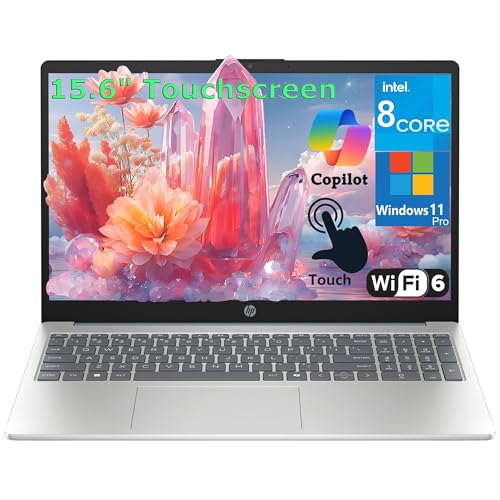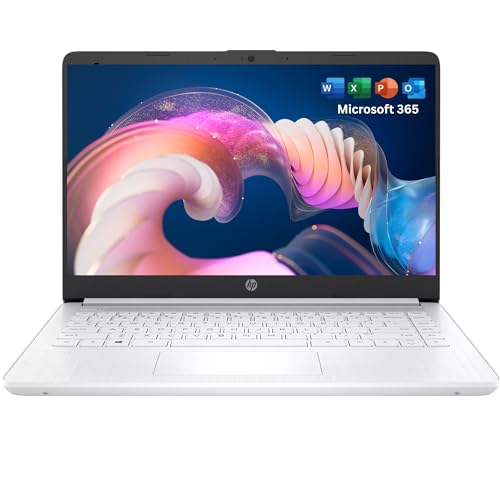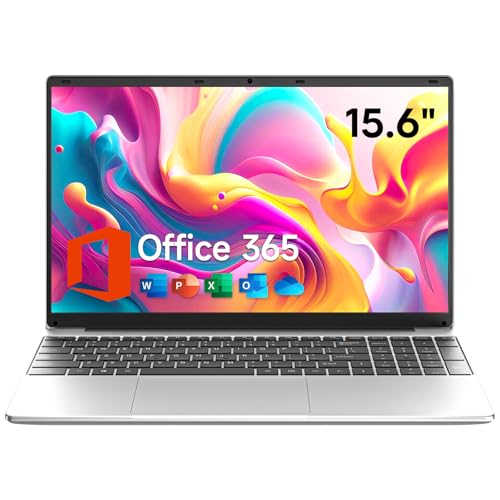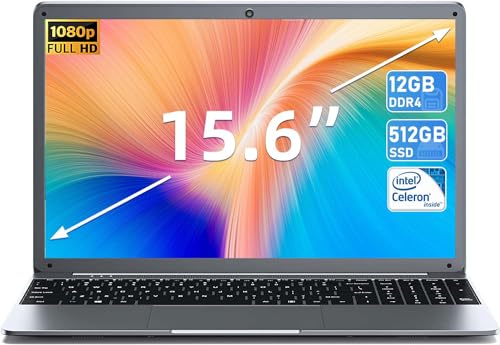In the past few years, Chromebooks have emerged as a promising alternative to “conventional” Windows and Mac laptops. Chromebooks are cheaper, faster, and have a longer battery life — but they also carry significant limitations due to their operating system. It all depends on your needs and how you want to use the computer. Here’s what I think you need to know in the debate of “Chromebook vs laptop”.

What’s the difference between a Chromebook and a laptop
| Feature | Chromebook | Laptop |
|---|---|---|
| Operating System | Chrome OS | Various options (Windows, macOS, Linux) |
| Software Compatibility | Primarily web-based apps and Chrome extensions | Wide range of desktop applications |
| Storage | Typically limited onboard storage (32GB – 128GB) | Larger storage options (starting from 256GB) |
| Performance | Generally lower-powered processors (Intel Celeron) | Wide range of processors available (Intel, AMD) |
| Price Range | Generally more affordable | Can vary widely, from budget to high-end options |
| Offline Capability | Limited offline functionality without internet access | Can run most applications and software offline |
| Customization | Limited customization options | Can be customized extensively |
| Gaming | Limited gaming capabilities (web-based games) | Better gaming performance with dedicated graphics cards |
| Security | Built-in security features, automatic updates | May require additional security software and updates |
| Battery Life | Typically longer battery life | Battery life can vary depending on the model |
| Portability | Lightweight and compact design | Varied form factors and sizes |
A Chromebook is also a laptop — it’s just that it’s a laptop that uses a different operating system (we’ll get to this in a bit). Chromebooks are designed for connectivity and primarily rely on web-based applications for cloud storage and functionality. They’re efficient, cheap, and simple. They emphasize speed, ease of use, and affordability.
Chromebooks excel at web browsing, email, document editing, and media streaming. But they have limitations when it comes to running resource-intensive software or specialized applications. They’re streamlined for professionals or students who are often on the move and use the computer for browsing. They’re not very versatile, however.
Unlike conventional laptops, which rely on Windows or macOS use only a web browser as their operating system. In fact, this is the biggest difference between Chromebooks and laptops.
Operating System: Chrome OS vs. Windows & macOS
As I mentioned, probably the most significant difference between a Chromebook and a laptop lies in the operating system (OS). Just like Apple uses its own operating system, Chromebooks also use their own operating system. Think of the operating system as the computer’s control center, managing everything from the apps you use to how you interact with the device.
The operating system manages all hardware and software on your computer. It loads when your computer starts up and essentially manages all of your computer’s resources. Some operating systems are more efficient and some are less efficient. Of course, things get more and more complicated, and operating systems often compromise. That’s exactly what Chromebooks do.
Chromebooks run on Google’s Chrome OS, a lightweight and fast operating system based on the Chrome web browser. If you’re an avid user of Google services like Gmail, Google Docs, and Google Drive, Chromebooks can be a natural solution. The simple and intuitive Chrome OS gives you quick access to your files and favorite web apps.
Laptops, on the other hand, typically run Windows or macOS (in the case of Apple’s MacBook). These are full-fledged operating systems designed for a wide range of uses, from simple web browsing to high-end video editing and graphic design. For power users and professionals who need specialized software tools, a Windows laptop or MacBook is a better choice.
Hardware: Power and Portability
Another area of contrast between Chromebooks and laptops lies in their hardware specifications.
Chromebooks generally feature more modest hardware configurations. They tend to incorporate low-power processors, smaller amounts of RAM, and limited local storage.
They can get away with this because the operating system is so good. Chrome OS is optimized to run efficiently on these specifications, enabling smooth performance for web-based tasks while keeping costs down. This makes Chromebooks an affordable option for those seeking a budget-friendly device. Simply put, you get more bang for the buck with a Chromebook.
Just look at the Chromebook bestsellers, they’re usually around the $200 mark — and often lower.
| # | Preview | Product | Rating | Price | |
|---|---|---|---|---|---|
| 1 |
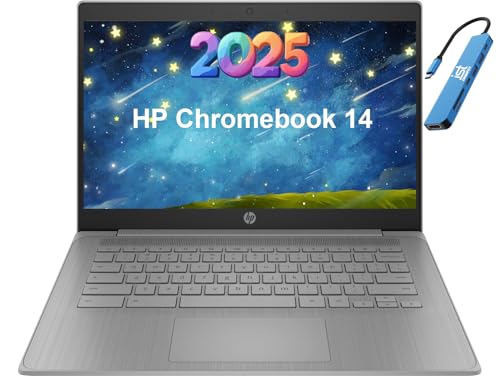
|
HP Chromebook 14 Laptop (14″ HD, Intel 4-Core Celeron N4120,… | $599.99 | Buy on Amazon | |
| 2 |

|
HP Chromebook 14 Laptop, Intel Celeron N4120, 4 GB RAM, 64… |
$171.34 |
Buy on Amazon | |
| 3 |

|
Lenovo Flagship Chromebook, 14” FHD Touchscreen Slim Thin… |
$198.87 |
Buy on Amazon | |
| 4 |

|
ASUS Chromebook CM14 Laptop, 14″ HD Anti-Glare Display… |
$161.00 |
Buy on Amazon | |
| 5 |

|
HP 15.6 HD Premium Chromebook, Intel Celeron N Processor… | $212.99 | Buy on Amazon |
In contrast, laptops offer a wide range of hardware options to suit various needs. They can be equipped with powerful processors, ample RAM, and larger storage capacities. This enhanced hardware allows laptops to handle resource-intensive applications, such as video editing software or demanding video games. However, the increased power and performance typically come at a higher price point.
When it comes to portability, both Chromebooks and laptops come in various sizes and weights. Chromebooks are often smaller, making them lightweight and highly portable. This makes them ideal for users frequently on the go, such as students or travelers.
Laptops, on the other hand, offer a broader range of screen sizes, from compact to larger displays. The choice between the two will depend on your preference for screen real estate and portability.
App Ecosystem: Web-based vs. Local
The app ecosystem is a crucial aspect to consider when comparing Chromebooks vs laptops. It determines the availability and compatibility of software applications on each platform. If I were writing this a few years ago, it would have been a very different review — but recently Chromebook apps have gotten much better.
Chromebooks primarily rely on web-based applications, accessed through the Chrome browser, and Android applications from the Google Play Store. These apps are designed to run in the cloud, requiring less local storage space and minimizing the need for software installations.
This web-based approach promotes ease of use and seamless synchronization across devices. However, it’s important to note that certain specialized software or professional-grade applications may not be available or optimized for Chrome OS, limiting their functionality on Chromebooks.
Laptops, on the other hand, provide a more extensive range of software options. They support traditional desktop applications, including resource-intensive software used in fields like graphic design, video editing, and gaming. The flexibility to install and run a wide array of software locally gives laptops an advantage for professionals or enthusiasts who rely on specific software tools.
Chromebook cost: relatively low
When it comes to cost, Chromebooks and laptops occupy different ends of the pricing spectrum. As we’ve mentioned in a previous article, here are our favorite low-budget Chromebooks.
Chromebooks are rather well-known for their affordability, thus making them an attractive option for budget-conscious individuals and families. They often come with lower price tags compared to laptops, with entry-level models starting as low as a few hundred dollars.
The lower cost of Chromebooks can be attributed to several factors, including their simplified hardware specifications and the lightweight Chrome OS, which requires less powerful components.
While Chromebooks offer excellent value for money, it’s important to note that more premium models with additional features, higher-resolution displays, or increased storage capacity may be priced higher. Nevertheless, even these higher-end Chromebooks tend to be more budget-friendly than their laptop counterparts with similar specifications. If money is your principal constraint, tip the balance towards Chromebooks.
Laptop cost: usually higher
Laptops, on the other hand, encompass a wider price range, offering options to suit different budgets and requirements. They come in various configurations, allowing for greater flexibility in terms of hardware specifications, performance, and design.
As a result, the cost of laptops can vary significantly, ranging from budget-friendly options to high-end, premium models. If money is not a constraint, look towards laptops more.
Entry-level laptops can often be found in a similar price range as lower-end Chromebooks — or rather, a comparable one. However, as you move up the price scale, laptops with more powerful processors, larger amounts of RAM, higher-resolution displays, dedicated graphics cards, and larger storage capacities become available. These premium features contribute to a higher price point compared to Chromebooks.
While laptops offer more versatility and power, it’s important to consider your specific needs when assessing their cost. If you require a laptop for resource-intensive tasks like video editing, gaming, or professional applications, you may need to invest in a higher-priced model.
However, if your computing needs primarily revolve around web browsing, document editing, and lightweight applications, a Chromebook can provide sufficient performance at a more affordable cost.
Price-wise, the Chromebook vs laptop tussle is won by the Chromebook.
| Advantages | Disadvantages |
|---|---|
| Affordable price range | Limited offline functionality |
| Lightweight and portable design | Restricted software compatibility |
| Quick startup and fast performance | Limited storage capacity |
| Secure and automatic updates | Dependency on stable internet connection |
| Built-in virus protection | Limited customization options |
| Seamless integration with Google apps | Limited gaming capabilities |
| Long battery life | Reliance on cloud storage for file management |
| Easy to use and intuitive interface | Incompatibility with certain professional apps |
| Low maintenance and automatic backups | Limited hardware options for high-end tasks |
Advantages of Chromebooks
Our top picks for the best price/quality Chromebooks.
Chromebooks bring several key advantages to the table, making them an appealing choice for a variety of users. However, not everyone’s needs will align with what a Chromebook has to offer. For some, a traditional laptop might be a more suitable choice. Let’s take a detailed look at the advantages of Chromebooks, and also discuss situations where a laptop might be the better option.
Simplicity
Chromebooks take simplicity and run away with it. It’s hard to explain just how well they make simplicity work unless you try them. A laptop that essentially runs on a browser sounds silly, but it’s simply good. The OS is designed to be intuitive and easy to use, making it a great choice for individuals who prefer a straightforward computing experience.
For anyone who regularly uses Google services like Gmail, Google Docs, Google Sheets, or Google Drive, a Chromebook integrates seamlessly into your routine. The interface is clean and user-friendly, reducing potential tech-induced stress.
However, if you’re accustomed to a Windows or macOS interface or require software that runs on these platforms, you may find a traditional laptop more suitable.
Speed
Chromebooks are known for their speed. Their lightweight operating system and solid-state drives (SSDs) ensure rapid boot times and responsive performance. This is perfect for users who need a device that’s ready to go at a moment’s notice. But, for users who need to run complex, resource-intensive applications or high-end games, a traditional laptop with a more powerful processor and more features could be desirable.
Disadvantages of Chromebooks
While Chromebooks have their strengths, they also carry several limitations. Big limitations at that. It’s important to understand these disadvantages before deciding whether a Chromebook is the right device for your needs.
Some Chromebooks also offer more performance, while also costing more. I wouldn’t really recommend this as an entry point, but if you know what you’re looking for, expensive Chromebooks are also a solution.
Limited Software
Perhaps the most significant disadvantage of Chromebooks is their dependence on web applications and Android apps from the Google Play Store. While these provide a broad range of software options, Chromebooks don’t support traditional Windows or macOS software. This limitation could be problematic if you require specific software for work, school, or personal projects.
Even though many Chromebooks can run Android apps (older ones don’t), not all apps are optimized for a Chromebook’s laptop-style layout. Some might not function as expected, or their interface might not scale well to a larger screen. However, if your needs revolve primarily around web-based services like email, web browsing, or online document editing, a Chromebook can efficiently handle these tasks.
Personally, I fall into the category of almost-always-online people — and yet still, I find myself annoyed sometimes by the lack of robustness of a Chromebook. It’s usually small things, but it can be annoying. You can prepare for this and minimize the impact. Still, in terms of available software, it’s not even close: the Chromebook vs laptop battle goes to laptops.
Limited Offline Capabilities
Chromebooks are designed to be always connected to the internet. While they can perform some tasks offline, such as editing Google Docs or Sheets, their functionality becomes somewhat restricted without an internet connection.
If you’re often in locations with unreliable internet, or if you prefer to work offline, you might find a traditional laptop more fitting. Granted, you can prepare for this. There are several apps you can download that also work well without online access.
Furthermore, improvements to Chrome OS and the growing selection of Android apps that support offline functionality make Chromebooks progressively more useful without an internet connection. If you mostly work online and only occasionally need offline capabilities, a Chromebook might still serve you well.
I found that this part can be overcome quite easily with a bit of experience. I think you’ll find this immensely frustrating at first, but once you get the useful apps that can help you work offline, you’ll be good to go, like with any laptop. If you’re always online — that’s even better. So in terms of connectivity, the Chromebook vs laptop battle is moving closer to a draw.
Storage Space
Compared to traditional laptops, Chromebooks typically offer less internal storage space. This is because Chromebooks are designed with the cloud-first approach in mind, encouraging users to store files online in Google Drive rather than on the device itself.
The limited storage can be a drawback if you need to store a large number of files locally, like high-resolution photos, music collections, or video files. If large local storage capacity is a priority for you, a traditional laptop would be a more suitable choice.
So if you’re debating getting a Chromebook vs a laptop, storage is also a concern.
Despite these limitations, many users find that Chromebooks meet their needs perfectly. Chromebooks are ideal for users who work primarily with web and cloud-based applications, do not require specialized software, and have reliable internet access. They provide a streamlined, easy-to-use, and budget-friendly alternative to traditional laptops. While they may not fit every use case, Chromebooks are certainly worth considering for their unique strengths.
When You Should Get a Chromebook
A Chromebook could be the ideal choice for you if:
- You primarily use web-based services and Android apps for your computing needs.
- You value a device that offers fast, reliable performance for basic tasks like web browsing, email, and document editing.
- You’re budget-conscious and want a device that provides good value for money.
- You require a device with long battery life for traveling, commuting, or long days without access to a charger.
When You Should Get a Laptop
Conversely, you should consider a traditional laptop if:
- You require specific, professional-grade software that isn’t available or optimized for Chrome OS.
- You need a device capable of more resource-intensive tasks like gaming, video editing, or 3D modeling.
- You prefer to work offline or require significant storage space on your device.
- You desire a more customized or upgradable hardware configuration.
The bottom line in the Chromebooks vs Laptops battle
In conclusion, the decision between a Chromebook and a laptop hinges on your individual needs, habits, and budget. If you know what you want, the decision should be straightforward. If you’re not sure what you want, you can always try a Chromebook and return it if it’s not what you’re looking for (your customer rights may vary depending on where you’re based, but in general, most countries and companies offer some return policy).
So the Chromebook vs laptop war doesn’t have a clear winner — it depends on what you want.
The bottom line is that Chromebooks offer a streamlined, web-based experience at an affordable price point, with robust battery life. Traditional laptops, while often more costly, provide more powerful hardware, broader software compatibility, and greater flexibility for offline work and storage.
The ideal device isn’t about the newest trends or the most powerful specs—it’s about what works best for you. Whether you opt for a Chromebook or a laptop, make sure it aligns with what you’re using the laptop for. Don’t blindly follow reviews, whether it’s ours or anyone else’s — think about what you need and follow that path.

